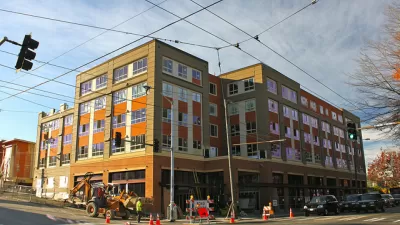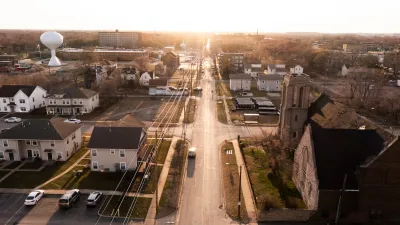An approved, 55 micro-unit, mixed-use development with no parking sited on a transit corridor with 15-minute headways has been halted by a legal ruling after neighborhood opponents proved the bus was not meeting its schedule.
"The 15-minute figure is important because it’s the metric the Seattle City Council set back in 2010 as one of the requirements for allowing developers to build apartment complexes in urban villages without providing parking," reports Daniel Person for Seattle Weekly.
A neighborhood coalition, Livable Phinney, formed to oppose the Phinney Ridge micro-unit development known as Phinney Flats, obtained data to prove that the bus wasn't precisely meeting its schedule, although to this correspondent, the deviance appeared minor.
Earlier this year, a PhD statistician analyzed bus data over the course of several months and determined that more than 15 minutes passed between buses about 38 percent of the time; 10 percent of the time there was a 20 minute gap, and 2 percent of the time a 25 minute gap.
But Livable Phinney pressed the letter of the law to its advantage. In front of a hearing examiner in May, the neighbors argued that 15 minutes means 15 minutes, and the city can’t rely on bus time tables as evidence that the requirement is being met. In his July 24 ruling, hearing examiner Ryan Vancil agreed the city “cannot simply ignore” data that shows buses are not coming every 15 minutes.
Coalition leader Irene Wall expressed her satisfaction in the group's July 26 press release:
“This is the first time that statistical evidence has been used to show that bus schedules are meaningless in the ever-increasing traffic congestion in Seattle,” Wall explained. “When a bus is unreliable, the City cannot expect people to forego [sic] their cars and rely on unreliable public transportation, and people who ride the bus also own cars.”
However, the city code requires other transportation demand management measure to supplement transit frequency. "In lieu of a parking space, they'll need to provide tenants with transit passes and memberships in car and bikeshare services," notes a May 2015 post on Seattle's innovative densification and residential parking policies.
"The ruling does not kill the project," adds Person. "Rather, it sends the permit back to Seattle Department of Construction and Inspections for further review. Transit was not the only issue the hearing examiner found fault with, though it did have the farthest reaching implications."
Phinney Flats is part of the solution to the problem expressed in Thursday's post, "New Levels of Car Dependence Follow Seattle's Growth." If Seattle is going to continue to grow rapidly, it needs to have innovative, flexible parking policies that reduce car ownership while increasing residential density. Livable Phinney's gain, even if only temporary, is greater Seattle's loss.
Hat tip to L.A. Metro Transportation Library.
FULL STORY: Late Buses Could Spell Trouble for Denser Development in Seattle

Planetizen Federal Action Tracker
A weekly monitor of how Trump’s orders and actions are impacting planners and planning in America.

Map: Where Senate Republicans Want to Sell Your Public Lands
For public land advocates, the Senate Republicans’ proposal to sell millions of acres of public land in the West is “the biggest fight of their careers.”

Restaurant Patios Were a Pandemic Win — Why Were They so Hard to Keep?
Social distancing requirements and changes in travel patterns prompted cities to pilot new uses for street and sidewalk space. Then it got complicated.

Albuquerque Route 66 Motels Become Affordable Housing
A $4 million city fund is incentivizing developers to breathe new life into derelict midcentury motels.

DC Area County Eliminates Bus Fares
Montgomery County joins a growing trend of making transit free.

Platform Pilsner: Vancouver Transit Agency Releases... a Beer?
TransLink will receive a portion of every sale of the four-pack.
Urban Design for Planners 1: Software Tools
This six-course series explores essential urban design concepts using open source software and equips planners with the tools they need to participate fully in the urban design process.
Planning for Universal Design
Learn the tools for implementing Universal Design in planning regulations.
Heyer Gruel & Associates PA
JM Goldson LLC
Custer County Colorado
City of Camden Redevelopment Agency
City of Astoria
Transportation Research & Education Center (TREC) at Portland State University
Camden Redevelopment Agency
City of Claremont
Municipality of Princeton (NJ)




























